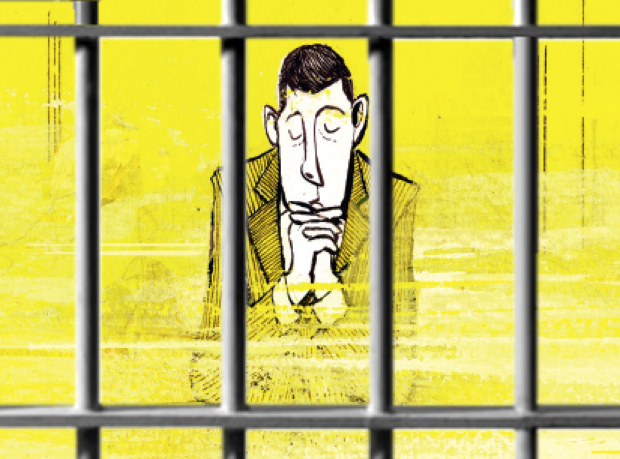Will Michael Gove dare to bring Christianity into his prison reform plans?
Written for The Spectator, 13 October 2015

This April, Michael Gove wrote in The Spectator: ‘To call yourself a Christian in contemporary Britain is to invite pity, condescension or cool dismissal.’ Certainly, the titters it provoked in the more left-wing corners of Twitter rather proved his point (a white man? complaining of prejudice?). On faith, as in everything else, Britain today erodes into fragments, small landscapes inhabited by the mutually deaf.
I carry no brief for the man: my instinctive sympathy with his school reforms is matched only by my frustration with what Ian Leslie, in a profile published this week, calls the temperament by which Gove ‘is drawn irresistibly to the theatre of battle’. But even his greatest enemies don’t deny that Gove is a man of conviction. (Indeed, many use it as an insult). In an age of bureaucrats, we’re hungry for any hint of principles: hence the election of Jeremy Corbyn, with his assumption of a monopoly on morality. It’s no surprise, then, that it was pressure from both Corbyn and Gove that pincered David Cameron into a climb-down over contracts with the Saudi prison system today.
But until now, Gove has struggled to establish his own moral narrative in the broader public eye, not least for the reasons he gently suggested in that Spectator feature. Listen to any Michael Gove speech and you’ll hear his passion for meritocracy framed in terms of self-fulfilment through virtue; hear him talk on prison reform, and you’ll pick up stories of redemption and repentance; even his opposition to Saudi Wahhabism is based on a vision of Christianity’s more merciful alternative. I sense that he’d love to be allowed to base his pitch on Christian values. But here in Britain, we don’t really do God.
Nowhere was this tension more apparent than in last night’s Panorama, which looked at prison reform in Texas. Ian Birrell took us on a journey through the American Right’s uneasy journey towards serious criminal justice reform. Gove came along for the ride, meeting with Texan lifers and shadowing a reformist judge, Robert ‘Bobby’ Francis, who runs a drugs rehab court. With rival liberalisation bills now going through both Congress and the Senate, US prison reform is a slow-burn success story, and, as David Dagan and Steven Teles explain in this in-depth study, a beacon for anyone who wants to see more co-operation across political divides.
Democrats focus on prison as an issue of racial justice, but Birrell is right to note that much of the conservative momentum behind prison reform in the US comes from low-tax advocates and campaigners for devolved government. Famously, Texas house congressman Jerry Madden was given one instruction by the Republican party when he started as chair of the House Corrections Committee: ‘Don’t build new prisons. They cost too much.’ Mandatory minimum sentences, the target of Congress’s committee bill, offend libertarians by tying the hands of local judges – and why should taxpayers pay for 25 years of prison when mitigating circumstances might mean they only need pay for 15?
That’s certainly why men like Grover Norquist have signed up to Right on Crime, the rehabilitation-based movement name-checked in Birrell and Gove’s documentary. But it doesn’t explain everything about conservatives who want to break prison chains. Early in Birrell’s documentary, we saw an ex-con, Alfred, attend church with his pastor son: a fleeting, all-too brief hint at the power of Christian redemption narratives in the Deep South. What we didn’t see is thatJudge Francis has appeared on Christian TV to talk about his Lutheran values; that the highly-praised Prison Entrepreneurship Programme combines capitalism with Christianity as routes to prosperity; that prison-reform’s biggest backers are popular Christian celebrities like footballers Bum Phillips and Mike Barber. As Bill Keller, former New York Times editor, explains in a profile for The Marshall Project, Right on Crime emerged from the work of Charles Colson and Pat Nolan, a Catholic and a born-again Christian who’d both served time for political corruption. (‘A conservative is a liberal who’s been mugged, a liberal is a conservative who’s served time.’)
This isn’t an easy sell to British voters. We’re weary of God as it is, let alone of a Texan movement fronted by ex-corrupt politicians claiming religious rehab as a career reboot. One of the signatories to Right on Crime is Tony Perkins, of the Family Research Council. When he’s not saying high-minded things about criminals still being ‘made in the image of God’, he’s campaigning against same-sex marriage and being accused of promoting sodomy laws in Uganda. If I were making a documentary aiming to persuade Brits of the value of prison reform, I wouldn’t seek out Perkins as a testimonial, either. Instead, we had Marc Levin of Right on Crime, who spent most of his airtime discussing prison costs but slipped in a one-word mention of ‘redemption’ as a motivation.
Even in Britain, however, prison reform has almost always been a Christian cause, from the Calvinist John Howard of the Howard League to the Quaker Elizabeth Fry (next time we need a woman on a banknote, can we please have her back?) Perhaps it’s too late to harness the power of Christianity for the prison reform movement in secular Britain today. But if we’re going to sell rehabilitation to the Daily Mail, we need an alternative moral framework, not just penny-pinching charts.
One of Panorama’s most intriguing moments showed Gove spotting the Bible placed in a young offender’s cell, before swiftly moving on. Notoriously, Gove had a Bible sent to every school in Britain, and paid a political price for it. If Bibles in schools are controversial, Bibles in prisons will be even more so. But it will be hard to make Texan rehab work in Britain without the religiosity that drives men like Judge Francis. And I suspect Michael Gove knows it.




